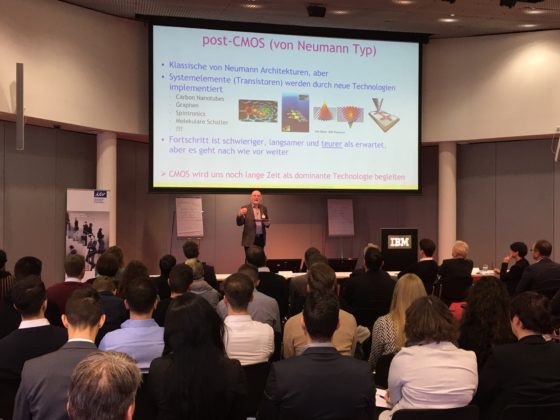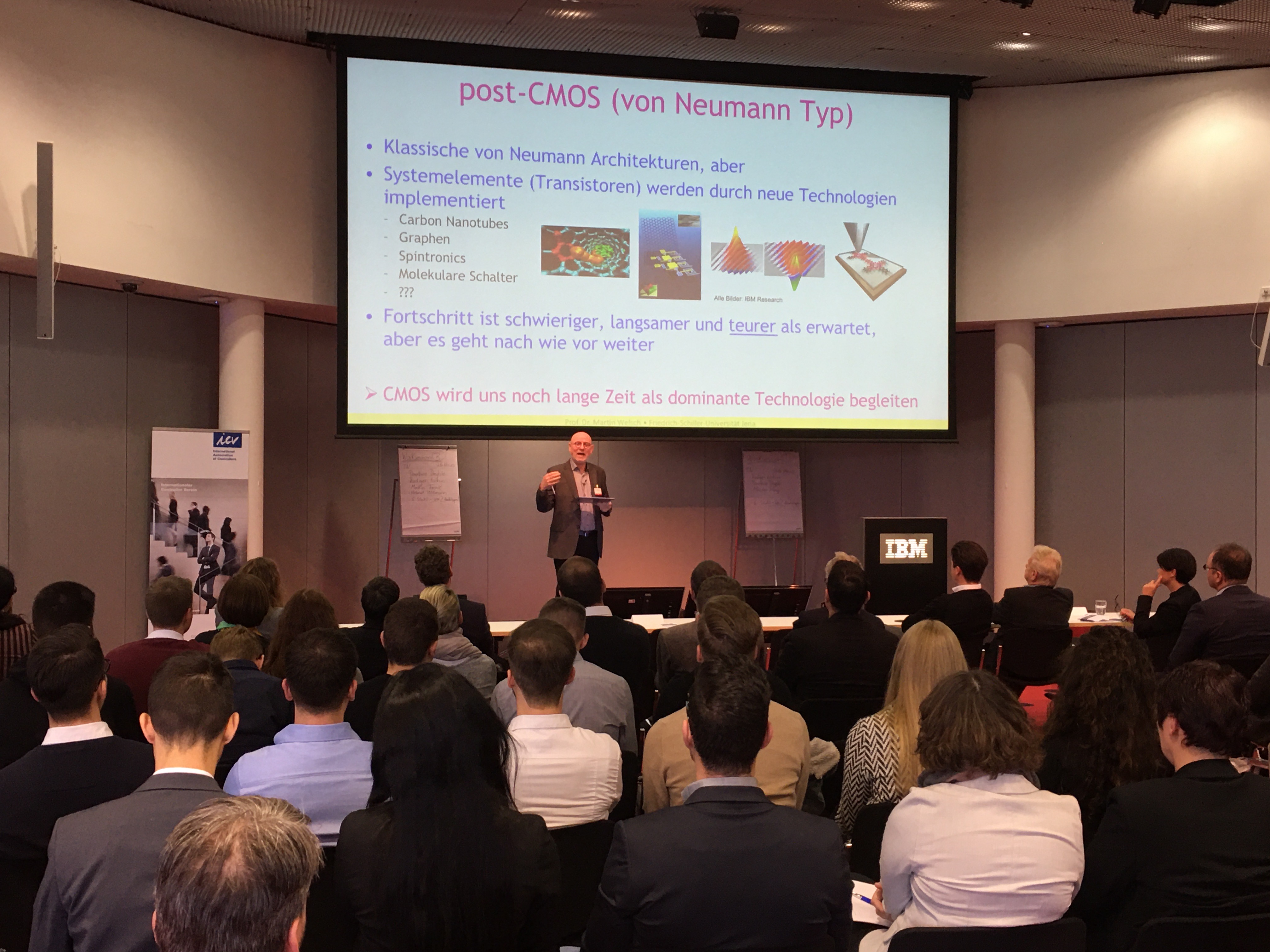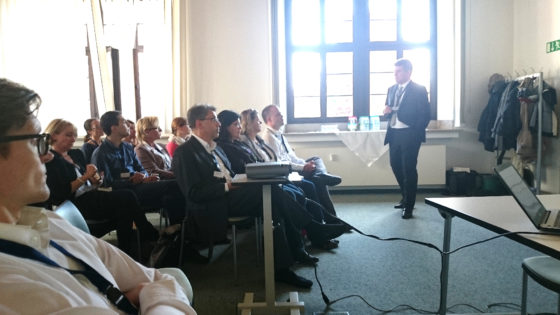 Rasant geht es zu beim ersten Vortrag des CCS 2019. Prof. Dr. Martin Welsch spricht über KI, Robotik, Neuromorphe und Quantencomputer. Der Chief Technology Advisor emeritus (IBM R&D) wirft einen Blick auf die unterschiedliche Rollen, in denen wir alle betroffen sind. Dabei zieht sich die Aussage “Wer glaubt, es verstanden zu haben, hat es immer noch nicht kapiert” wie ein roter Faden durch seinen Vortrag. Etwa beim Thema Quantentechnik. “Die Quantenmechanik erlaubt uns zu verstehen, was passieren könnte – aber nicht, was tatsächlich passieren wird”, denn “die Welt ist nun mal nicht intuitiv”. Genau deshalb müssten sich Industrie, Gesellschaft und Individuen immer wieder neu ausrichten. Beispielsweise Künstliche Intelligenz KI: das größte Problem in der öffentlichen Wahrnehmung sei massive Überschätzung und werde gerne noch im Bereich Science Fiction angesiedelt. Ganz anders die Wahrnehmung von KI in den Unternehmen. Hier werde Künstliche Intelligenz weiterhin massiv unterschätzt. Was KI aber wirklich kann: Muster erkennen, maschinelles Lernen – ganz ohne Magie und Hexerei können etwa reale Fotos so verfremdet werden, dass sie wirken wie ein Bild aus der Hand von Weltklassemalern.
Rasant geht es zu beim ersten Vortrag des CCS 2019. Prof. Dr. Martin Welsch spricht über KI, Robotik, Neuromorphe und Quantencomputer. Der Chief Technology Advisor emeritus (IBM R&D) wirft einen Blick auf die unterschiedliche Rollen, in denen wir alle betroffen sind. Dabei zieht sich die Aussage “Wer glaubt, es verstanden zu haben, hat es immer noch nicht kapiert” wie ein roter Faden durch seinen Vortrag. Etwa beim Thema Quantentechnik. “Die Quantenmechanik erlaubt uns zu verstehen, was passieren könnte – aber nicht, was tatsächlich passieren wird”, denn “die Welt ist nun mal nicht intuitiv”. Genau deshalb müssten sich Industrie, Gesellschaft und Individuen immer wieder neu ausrichten. Beispielsweise Künstliche Intelligenz KI: das größte Problem in der öffentlichen Wahrnehmung sei massive Überschätzung und werde gerne noch im Bereich Science Fiction angesiedelt. Ganz anders die Wahrnehmung von KI in den Unternehmen. Hier werde Künstliche Intelligenz weiterhin massiv unterschätzt. Was KI aber wirklich kann: Muster erkennen, maschinelles Lernen – ganz ohne Magie und Hexerei können etwa reale Fotos so verfremdet werden, dass sie wirken wie ein Bild aus der Hand von Weltklassemalern.
Welsch ging aber auf die Probleme und Fehlleistungen von KI ein, u.a. auf den Twitter Bot “Tay”, der durch die Teilnahme von Trollen und Hackern an der “Erziehung” als beleidigender, anzüglicher Rassist endete und schnell vom Netz genommen werden musste. Für die Zukunft zeigte Welsch den Bereich Medizin als neues, großes Spielfeld der KI auf – für IT-Unternehmen auch deshalb interessant, weil damit der Zugriff auf persönliche Daten einhergehen.
Zum Thema Robotik erinnerte Welsch an die “Menschenwaschmaschine”, die in Japan nicht an der Akzeptanz, sondern am Preis gescheitert sei. “Wenn wir IT nicht mehr als IT wahrnehmen, dann ist ein entscheidender Schritt vollzogen – und an vielen Stellen in der Gesellschaft bereits geschehen”. Welsch forderte deshalb, immer wieder über den Tellerrand zu schauen, immer wieder vorauszuschauen, um Nachsehen zu vermeiden. Seine Tipps für Unternehmer:
- Bleiben Sie dran! Wenn Sie es nicht selbst wollen oder können, finden Sie jemanden, der es für Sie tut. Schaffen Sie Freiräume für die, die sich dafür interessieren. Ermutigen Sie Ihre Entscheider!
- Die Herausforderung ist in der Regel nicht die Technik – es sind die Menschen, “die Bewahrer des Erfolgs” und “die Ängstlichen”.
Abschließend betonte Welsch: “Der Himmel fällt uns nicht auf den Kopf, aber der Fortschritt muss verantwortungsvoll gestaltet werden”. IT sei eben mehr als Technologie und wir alle Teil dieses Prozesses und kalkulierte Risiken. “Die Zukunft könnte schneller kommen, als man denkt”.
 The first CCS speech 2019 is a great success. Martin Welsch talks about AI, robotics, neuromorphs and quantum computers. Chief Technology Advisor emeritus (IBM R&D) takes a look at the different roles in which we are all affected. The statement “Who thinks, they understood it, did not get it at all” appears in his entire speech. For example, the topic of quantum technology. “Quantum mechanics allows us to understand what could happen – but not what will actually happen,” because “the world is not intuitive.” That’s why industry, society and individuals have to reorient themselves. For example Artificial Intelligence AI: the biggest problem in public perception is massive overestimation and settling AI in the field of science fiction. The perception of AI in companies is quite different. Artificial Intelligence continues to be massively underestimated here. But what AI really can do is recognizing patterns, machine learning can for example – without any real magic and witchcraft – change real photos in such a way that they look like pictures made by world-class painters.
The first CCS speech 2019 is a great success. Martin Welsch talks about AI, robotics, neuromorphs and quantum computers. Chief Technology Advisor emeritus (IBM R&D) takes a look at the different roles in which we are all affected. The statement “Who thinks, they understood it, did not get it at all” appears in his entire speech. For example, the topic of quantum technology. “Quantum mechanics allows us to understand what could happen – but not what will actually happen,” because “the world is not intuitive.” That’s why industry, society and individuals have to reorient themselves. For example Artificial Intelligence AI: the biggest problem in public perception is massive overestimation and settling AI in the field of science fiction. The perception of AI in companies is quite different. Artificial Intelligence continues to be massively underestimated here. But what AI really can do is recognizing patterns, machine learning can for example – without any real magic and witchcraft – change real photos in such a way that they look like pictures made by world-class painters.
Welsch, however, introduced also the problems and failures of AI, e.g. the Twitter bot “Tay”, which ended with the participation of trolls and hackers in the “education” as insulting, offensive racist and had to be quickly taken off the net. For the future Welsch sees the area of medicine as a new, big playing field of the AI – also interesting for IT companies because it goes along with the access to personal data.
On the topic of robotics Welsch reminded of the “people washing machine”, which failed in Japan not because of the lack of acceptance, but because of the price. “If we no longer perceive IT as IT, then a decisive step has been taken – and that has already happened in many places in the society”. Welsch therefore demanded that we always think outside the box and keep looking ahead. His tips for entrepreneurs:
- Stay tuned! If you cannot or do not want to do it yourself, find someone to do it for you. Create space for those who are interested. Encourage your decision makers!
- The challenge is usually not the technology – it’s the people, “the preservers of success” and “the timid”.
Welsch concluded, “The sky does not fall on our heads, but progress must be made responsibly.” IT is just more than technology and we are all part of this process and calculated risks. “The future could come faster than you think.”



